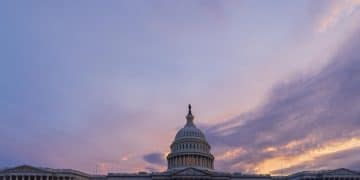How New Social Media Regulations Impact US Political Discourse

New regulations on social media companies could significantly alter political discourse in the US, affecting everything from election campaigns to public opinion formation.
The landscape of online political discourse in the United States is poised for a significant shift. New regulations targeting social media companies are on the horizon, and the question on everyone’s mind is: How Will the New Regulations on Social Media Companies Affect Political Discourse? What changes can we anticipate, and how will these impact the way political ideas are shared and debated?
Understanding the Current Social Media Landscape
To fully grasp the potential effects of new regulations, it’s crucial to understand the current role social media plays in US political discussions. Social media platforms have become indispensable tools for political campaigns, news dissemination, and citizen engagement, for better or worse.
Social Media as a Primary Source of News and Information
Social media platforms now rival traditional news outlets as primary sources of information, especially for younger demographics. This shift has numerous implications, including the potential for the rapid spread of misinformation and the creation of echo chambers.
The Role of Algorithms in Shaping Political Views
Algorithms on social media platforms play a significant role in determining what content users see. These algorithms are designed to maximize engagement, which can inadvertently prioritize sensational or polarizing content over nuanced or factual information.

In the evolving environment of social media’s reach and impact, several considerations emerge. It’s clear the current scenario has the potential to reshape the way people perceive and interact with politics, influencing crucial elements of the electoral and policy landscape. Some critical elements include:
- The Speed of Dissemination: Social media allows for rapid spread of information.
- Echo Chambers: Algorithms often reinforce existing beliefs.
- Misinformation: Platforms struggle to effectively combat false information.
In summary, understanding how social media currently shapes political discourse is essential for anticipating the impact of any new regulations. The influence these platforms wield requires careful consideration.
The Impetus for New Social Media Regulations
Growing concerns about misinformation, election interference, and the amplification of harmful content have fueled the drive for social media regulations. Lawmakers and the public alike are demanding greater accountability from these platforms due to several events.
Concerns About Misinformation and Disinformation
The spread of misinformation and disinformation on social media has been widely documented, particularly during election cycles and public health crises. These efforts to deliberately spread false or misleading information have the ability to sway public opinion which in turn can have harmful effects.
Debates Over Free Speech vs. Platform Responsibility
One of the central debates surrounding social media regulation is balancing freedom of speech with the responsibility of platforms to moderate harmful content. This discussion touches on constitutional rights, platform neutrality, and the potential for censorship.
The push for new regulations in the social media sphere is further motivated by these factors:
- Protecting Democracy: Safeguarding elections from foreign interference.
- Combating Hate Speech: Reducing the spread of hate speech, bullying, and harassment.
- Ensuring Transparency: Demanding greater transparency in content moderation policies.
Ultimately, the mounting pressure to regulate social media stems from a desire to mitigate the negative impacts of these platforms on society, particularly in the political arena. Protecting the integrity of democratic processes remains a key focus.
Key Proposals for Social Media Regulation
Several regulatory proposals are being considered at both the state and federal levels, each with different approaches to addressing the challenges posed by social media. These proposals vary significantly in scope and potential impact.
Changes to Section 230 of the Communications Decency Act
Section 230 of the Communications Decency Act currently provides broad immunity to social media platforms for content posted by their users. Proposals to amend or repeal Section 230 aim to make platforms more responsible for the content they host.
Data Privacy and Security Regulations
Some proposals focus on enhancing data privacy and security regulations to give users more control over their personal information and limit the ability of platforms to collect and use data for targeted advertising. States like California have already enacted comprehensive data privacy laws.

A summary below details some potential legislative moves toward increased social media oversight:
- Increased Liability: Holding platforms legally responsible for harmful content.
- Enhanced Transparency: Requiring platforms to disclose content moderation practices.
- Data Protection: Strengthening data privacy laws to protect user information.
In conclusion, the regulatory landscape surrounding social media is complex and evolving. Understanding the key proposals and their potential consequences is essential for navigating the future of political discourse online.
Potential Impacts on Political Campaigns
New regulations could significantly alter the way political campaigns operate and communicate with voters. These changes could affect everything from advertising strategies to grassroots organizing.
Restrictions on Political Advertising
Regulations limiting the use of microtargeting or banning certain types of political ads could force campaigns to adopt broader, less personalized messaging strategies. This could also reduce the effectiveness of online advertising compared to traditional methods.
Changes in Grassroots Organizing and Mobilization
Social media has become an essential tool for grassroots organizing and voter mobilization. Regulations that restrict the ability of campaigns to communicate with potential supporters or organize events online could hamper these efforts.
Here is a quick look at some possible shifts in campaign activity:
- Advertising Costs: Reduced microtargeting could increase costs.
- Campaign Reach: Limitations could affect a campaign’s ability to reach key voters.
- Engagement Strategies: Campaigns may need to innovate new digital engagement methods.
Overall, new regulations promise to reshape the strategies political campaigns employ, potentially leveling the playing field and altering the dynamics of voter engagement.
The Role of Social Media in Public Opinion Formation
Social media’s influence on public opinion cannot be understated. New regulations could dramatically change how information is consumed and processed, directly impacting public sentiment and political participation.
Combating Echo Chambers and Filter Bubbles
Regulations targeting algorithms that create echo chambers could expose users to a wider range of perspectives and promote more balanced public discourse. The challenge lies in implementing these changes without infringing on free speech principles.
Promoting Informed and Civil Discourse
Some proposals aim to promote more informed and civil discourse by requiring platforms to label or remove false or misleading information and to enforce community standards that prohibit hate speech and harassment. The goal is to create a healthier online environment that encourages constructive dialogue.
Key changes could include:
- Diversity of Information: Breaking down echo chambers to promote varied perspectives.
- Fact-Checking Initiatives: Reducing the spread of misinformation through labeling and removal.
- Community Standards: Creating safer online environments that encourage constructive dialogue.
In summary, social media regulations may steer public discourse towards increased understanding and engagement, although balancing regulations and freedom of expression will remain a critical consideration.
Challenges and Criticisms of New Regulations
While the intention behind new regulations is to address legitimate concerns, these proposals are not without their challenges and criticisms. Balancing the desire to regulate social media with concerns about free speech and innovation is a complex task.
Concerns About Censorship and Free Speech
Critics argue that some regulatory proposals could lead to censorship and stifle free speech by giving platforms too much power to decide what content is acceptable. They also raise concerns that regulations could be used to silence dissenting voices or suppress unpopular opinions.
Potential Impact on Innovation and Competition
Regulations that impose significant compliance costs on social media companies could stifle innovation and make it harder for new platforms to compete with established players. This could lead to a more concentrated and less dynamic online landscape.
Some of the primary pushbacks include:
- Risk of Overreach: Safeguarding against potential censorship.
- Innovation Stifling: Considering the effect on emerging platforms.
- Enforcement Difficulties: Addressing challenges in implementing regulations effectively.
Successfully navigating the integration of new social media regulations requires carefully weighing their benefits against potential drawbacks, ensuring a balance between regulation and the preservation of democratic ideals.
| Key Point | Brief Description |
|---|---|
| 📢 Regulation Impact | New laws may change political ads and grassroots efforts. |
| 🌐 Opinion Formation | Rules could fight echo chambers for better conversations. |
| ⚖️ Free Speech | Finding balance is tough, regulations face free speech concerns. |
| 🚀 Innovation | Rules might slow down new ideas & competition in the industry. |
[FAQ Section]
Frequently Asked Questions
▼
New rules could limit targeted ads, forcing campaigns to use broader methods. This might increase costs and change how campaigns interact with voters online.
▼
The chief concern is balancing regulation with free speech. Critics fear overreach could lead to censorship and suppress different viewpoints unfairly.
▼
Echo chambers amplify similar opinions, limiting exposure to diverse perspectives. This can reinforce biases and reduce open, constructive dialogue among people.
▼
Yes, increased compliance costs might stifle innovation. New platforms may struggle to compete with larger, established companies, reducing dynamism in the industry.
▼
They could promote more informed discussion by combating misinformation. However, restrictions could also affect access to varied viewpoints, depending on implementation details.
Conclusion
As the digital era evolves, the intersection of social media and political discourse will continue to be a focal point of debate and regulation. How these new regulations ultimately play out will depend on a delicate balance, and shape political communication in the US.





